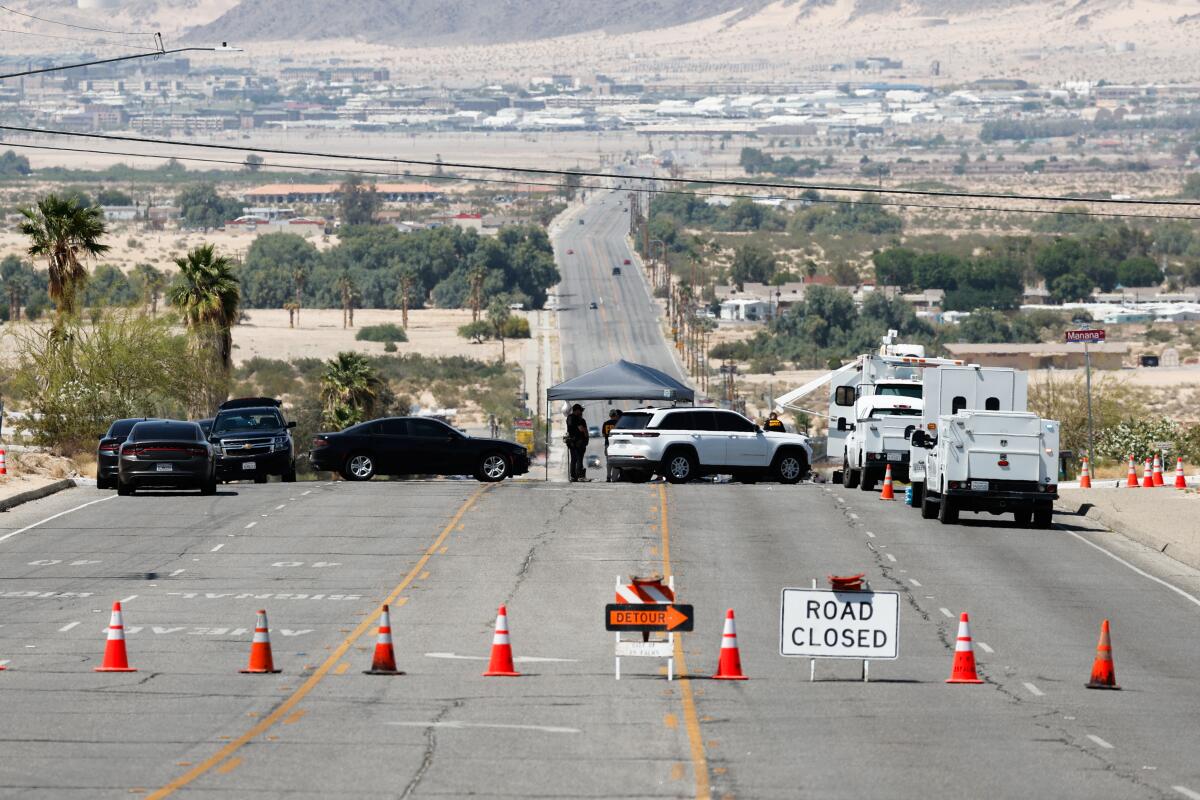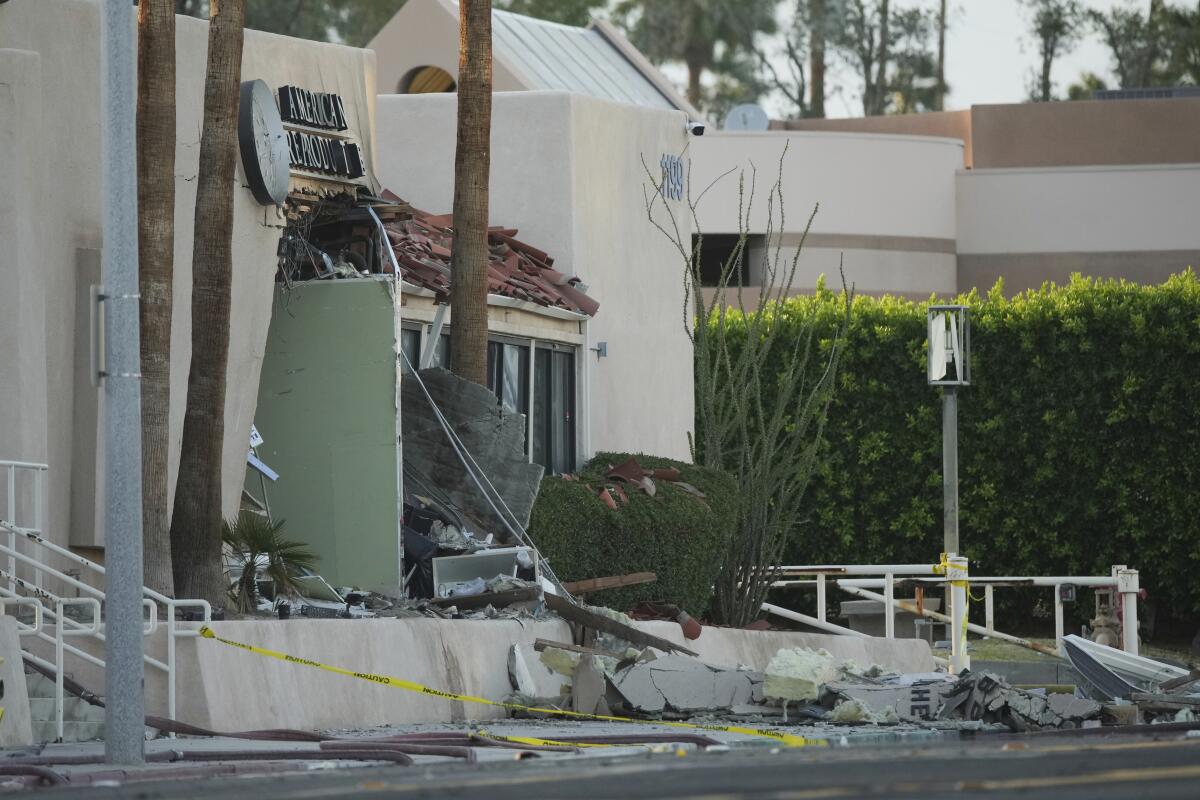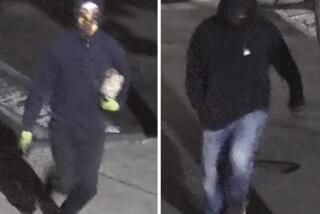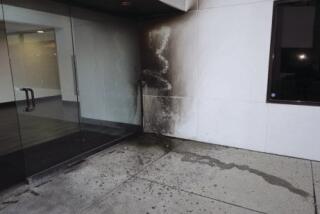Online manifesto threatened clinic attack; FBI probes Palm Springs bomb suspect’s motive

- Share via
- An online website that contained no name, but appeared connected to the bombing, laid out the case for “a war against pro-lifers” and said a fertilization clinic would be targeted.
PALM SPRINGS — The suspect in the bombing of a Palm Springs fertility clinic that injured four people was tentatively identified Sunday by the FBI as Guy Edward Bartkus, a 25-year-old “with nihilistic ideations.”

Bartkus appears to have been killed in the Saturday morning explosion at American Reproductive Centers, according to FBI officials who are investigating the incident as an “act of intentional terrorism.”
“We believe he was the subject found by the vehicle,” said Akil Davis, assistant director in charge of the FBI’s Los Angeles Field Office, referencing a 2010 silver Ford Fusion sedan near the explosion site.
Davis said investigators believed the suspect was attempting to livestream the attack, which he described as “the largest bombing ever investigated in Southern California.”
Law enforcement sources told The Times that the bomber used a very large amount of explosives — so many the bomb shredded his remains — and may not have intended to be killed in the blast. They also said the suspect appeared to be “anti-life” — an “antinatalist” who believed that procreation is unethical or unjustifiable — and interacted with like-minded people in social forums. In addition, he appeared to be reacting to the recent death of a friend.
Investigators, they said, were looking into a manifesto posted online, social media and a YouTube account mentioning explosives — the latter of which they were still verifying.
An online website that contained no name, but appeared connected to the bombing, laid out the case for “a war against pro-lifers” and said a fertilization clinic would be targeted.
A suspected bomb blast that authorities believe was ‘an intentional act of terrorism’ outside a Palm Springs fertility clinic left one person dead and additional people injured.
“Here you can download the recorded stream of my suicide & bombing of an IVF clinic,” the site began, but no such file existed. The site extolled a hodgepodge of philosophies, from “abolitionist veganism,” the opposition to all animal use by humans, and “negative utilitarianism,” the idea that we should act to minimize suffering rather than maximize pleasure in the world.
“Basically, I’m a pro-mortalist,” the author wrote, referring to a fringe philosophical position that it is best for sentient beings to die as soon as possible to prevent future suffering.
The Times could not independently confirm that Bartkus created the website. Domain data show the site was created in February.
Davis declined to verify whether the manifesto was written by the suspect, adding his team was “tracking a possible manifesto out there, and it’s part of our ongoing investigation.”
In the manifesto, the author denounced those who bring human life into the world and declared an end goal of “sterilizing this planet of the disease of life.”

“Life can only continue as long as people hold the delusional belief that it is not a zero sum game causing senseless torture, and messes it can never, or only partially, clean up,” the site said. “I think we need a war against pro-lifers. It is clear at this point that these people aren’t only stupid, they simply do not care about the harm they are perpetuating by being willing agents for a DNA molecule.”
Accompanying the website was a 30-minute audio file, labeled “pre,” that began with the speaker saying he would explain “why I’ve decided to bomb an IVF building or clinic.
“Basically, it just comes down to I’m angry that I exist and that, you know, nobody got my consent to bring me here,” the speaker said.
The fertility clinic, surrounded by other medical buildings, was closed at the time of the bombing. Although the bomb ripped the building in half, the clinic’s director said no embryos were harmed.
“Our lab — including all eggs, embryos, and reproductive materials — remains fully secure and undamaged,” the business said in a statement posted online. “Our mission has always been to help build families, and in times like these, we are reminded of just how fragile and precious life is.”
The bomb explosion in Palm Springs outside a fertility clinic Saturday caused damage for blocks and has been classified as an intentional act of terrorism.
On the website with the manifesto and hidden in the site’s underlying code, the author referenced the recent death of a person the writer claimed as a close friend, “Sophie.” The references match the April 20 death of a Washington woman allegedly shot by her partner at — he says — her request.
A law enforcement bulletin reviewed by The Times said the suspect appeared to become more depressed after the recent death of a female friend.
“I’ve never related to someone so much, and can’t imagine I ever would again,” the author said in the manifesto, noting that he and “Sophie” identified as “anti-sex misandrists” and “VegAntinatalists” and had a “borderline personality ‘disorder.’ ”
The website suggested the two had come to an agreement: “If one of us died, the other would probably soon follow,” the author said. “It’s just too much of a loss when there’s nobody else you really relate to significantly.”
Brian Levin, the founder of the Center for the Study of Hate and Extremism and professor emeritus at Cal State San Bernardino, said, after looking through the manifesto that many in the community have linked to the suspect, that the author appeared to be part of a growing movement of alienated lone actors radicalized on obscure internet sites and misinformation.
“The antinatalism movement he links to specifically condemns violence,” Levin said. “Still, his purported rambling, idiosyncratic ‘political’ statements paint a far different picture — that of a hopeless unstable young man whose suicidal despair stirs him into a self-consuming brutal death justified by a personally distorted embrace of an obscure anti-life ideology.”
Over the last two decades, Levin said, a string of young male loners, barely into adulthood, have erupted in extreme violence as a result of a mix of social estrangement, unrestrained online radicalization and aggression, as well as unaddressed psychological distress.
“We’re seeing the violent extremism landscape be seriously influenced by lone actors, a freewheeling and broad social media, and an idiosyncratic wave, from these loners who are able to either glom onto segments of existing broad movements, or find a niche in a particularly obscure one.”
Historically, Levin said, it would have been harder for an individual to have an obscure ideology validated and legitimized and gain the knowledge to carry out such an attack.
“Today, we basically have a DIY ecosystem where lone folks can engage in conduct that previously tilted more towards groups and small cells,” Levin said. “There’s a whole cauldron that involves radicalization, misinformation, legitimization of violence as a method within this grievance set and that’s what you have.”
Investigators were at Bartkus’ house within hours of Saturday’s explosion.

San Bernardino County Sheriff’s deputies asked residents on one end of the community to leave their homes as they cleared a blast radius, then waited on a judge’s warrant to search a house tied to the bombing suspect.
An online address directory showed the house had been used by Bartkus since 2019.
Jeanette Hogan, who said she did not know the Bartkus name, lived directly across the street and had not seen occupants in the house for several months. “We’ve never seen him out and about, so this is all like shocking to us,” Hogan said. “It’s a bit unsettling to know our neighbor was doing something so evil.
“Thank goodness it was a Saturday and that they didn’t have any patients.”
Thomas Bickel, who lived directly behind the suspect’s home, also said he had never seen Bartkus. He said sheriff’s deputies at about 1 p.m. asked him to leave his house, and he decamped to the Cactus Bar to wait out the search.
Eight hours later, Bickel was still there, nursing a beer on the patio while watching federal agents down the street walk in and out of the suspect’s house. At one point, they sent a robot into the house, while drones and a helicopter hovered overhead.
An FBI agent whose car was parked at the perimeter told Bickel that the bomb used in Palm Springs was “large.” An Army veteran who served in Afghanistan, Bickel said he was familiar with the destructive power of roadside bombs.
“I’m not saying this in a positive way,” he said, “but it was somebody who knew what they were doing,”

The car blast was so large it tore through the clinic and sent debris blocks away, breaking windows in a nearby hospital while propelling the suspect’s crumpled vehicle in the other direction across a back parking lot.
Nick Jacob Sivetz was about nine blocks away at the Graffiti Yard when he heard the explosion. He said his roommate at their home, about six miles away, also heard the blast.
Sivetz ran to the scene to find businesses with their windows blown out, debris strewn across the road. Amid the confusion, he said, many residents thought there had been a gas explosion.
“I would say the entire city was shook,” Sivetz said. “It was surprising for a lot of people, especially in a quiet city like this.”
Palm Springs’ reputation as an inclusive community, and the American Reproductive Centers’ work in assisting same-sex couples in using surrogates to have children, sparked early fear that the attack was a hate crime against the LGBTQ community.
“Fertility treatments, including IVF, have become increasingly politicized by far-right extremists over the past couple of years,” Equality California Director Tony Hoang said in a statement released to the media.
“No one should fear for their safety while accessing healthcare. We join the chorus of voices calling on local, state, and federal law enforcement officials to conduct a thorough investigation, and send our support to the greater Palm Springs community grappling with this shocking violent act.”
More to Read
Sign up for Essential California
The most important California stories and recommendations in your inbox every morning.
You may occasionally receive promotional content from the Los Angeles Times.

















